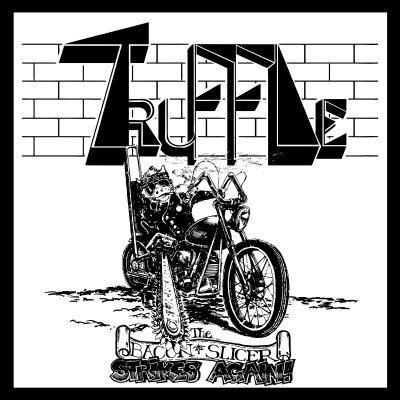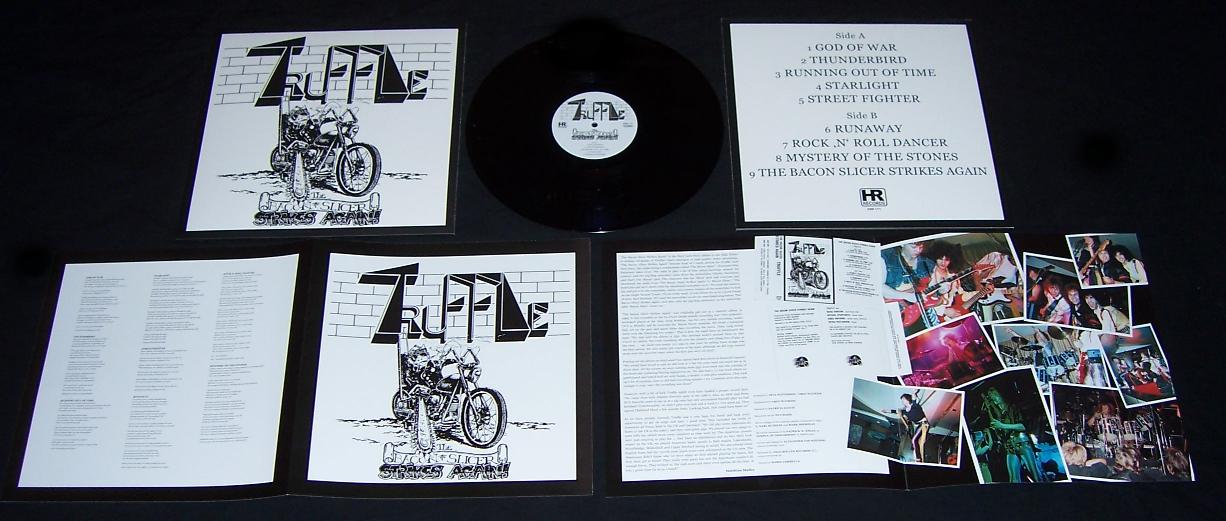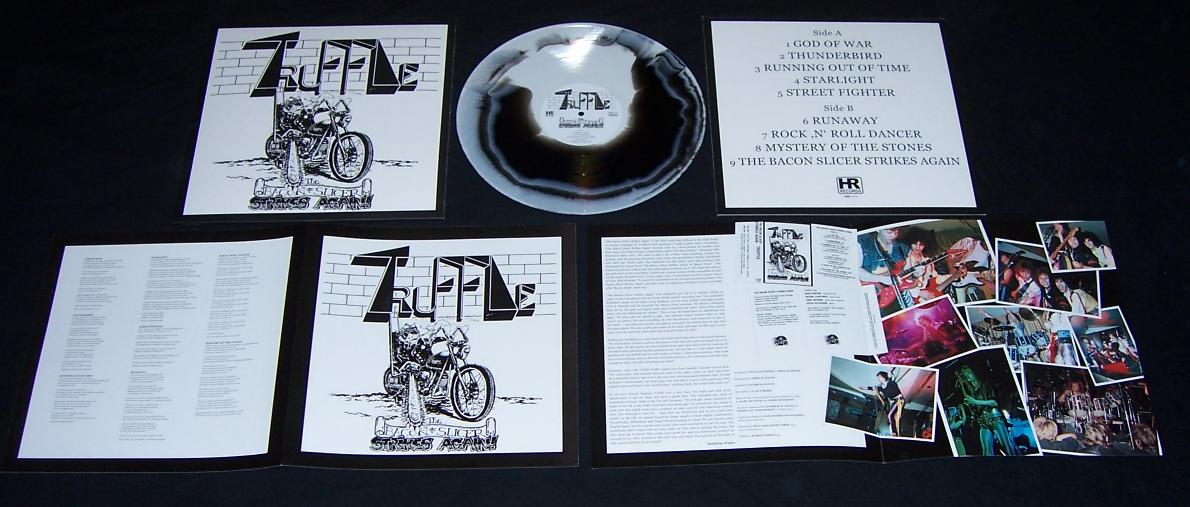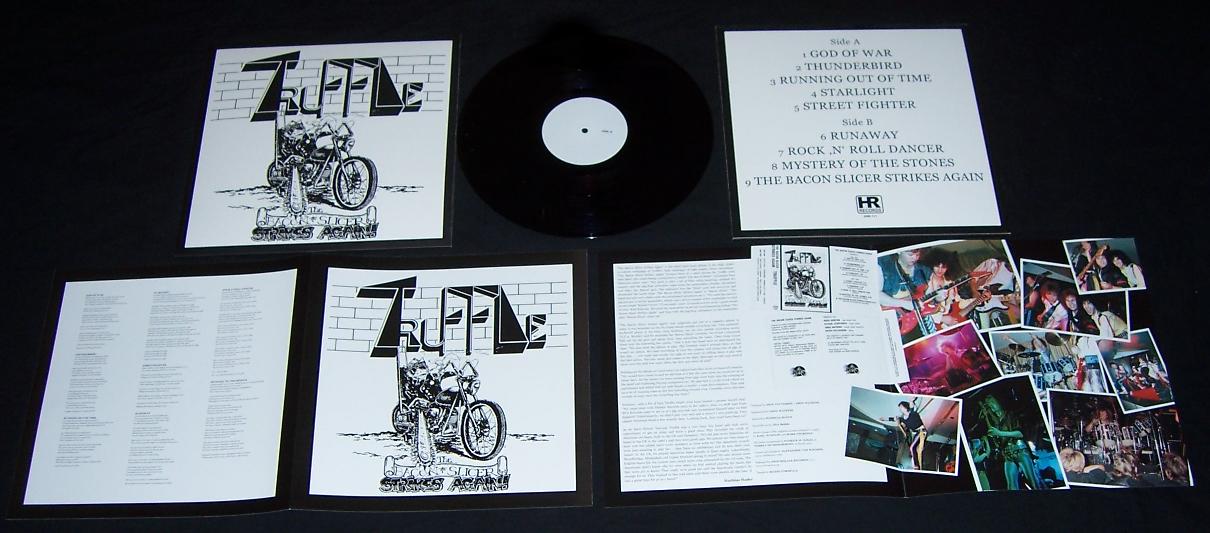 | ||||
| TRUFFLE - The Bacon Slicer Strikes Again LP | |
HRR 171, limited to 500 copies, 150 x black/ white blend vinyl + 350 x black vinyl, 4 page lyric insert | |
| Russ Horton - Bass / Lead vocals Ritchie Stopforth - Guitar / vocals Pete Patterson - Drums Greg Watkins - Guitar / Keyboards / vocals | |
| -God Of War -Thunderbird -Running Outa Time -Starlight -Street Fighter -Runaway -Rock'n'Roll Dancer -Mystery Of The Stones -The Bacon Slicer | |
| SOLD OUT! | |
“The Bacon Slicer Strikes Again” is the third (and final) album in the High Roller re-release campaign of Truffle’s back catalogue of high-quality demo recordings. “The Bacon Slicer Strikes Again” became kind of a catch phrase for Truffle (and their fans), the origin being a composition called “The Bacon Slicer”. Drummer Pete Patterson takes over: “We used to play a lot of bike rallys/meetings around the country and the pig/hog caricature came from the motorbikes (Harley Davidson) and that's the ‘Bacon’ part. The chainsaw was the ‘Slicer’ part and everyone just shortened the name from ‘The Bacon Slicer Strikes Again’ to ‘Bacon Slicer’.“ The band also put out t-shirts with the mentioned caricature on it: “We used the cartoon pig and put it on the motorbike, which was a newer version of the motorbike we had on the single ‘Round Tower’/’If you really want’. It was drawn for us by a good friend of ours: Karl Rudziak. We used the motorbike on all our merchandising before ‘The Bacon Slicer Strikes Again’ and then with the pig/hog caricature on the motorbike after ‘Bacon Slicer’ came out.”
"The Bacon Slicer Strikes Again" was originally put out as a cassette album in 1985. It was recorded on the No Fixed Abode mobile recording van: “Our guitarist/keyboard player at the time, Greg Watkins, ran his own mobile recording studio (N.F.A. Mobile) and he recorded the ‘Bacon Slicer’ sessions. We hired a rehearsal hall, set up the gear and spent three days recording the tunes. Then Greg mixed them over the following few weeks.” This is how the band later on distributed the tape: “We just sold the album at gigs. The internet wasn't around then, so that wasn't an option. We were travelling all over the country and doing lots of gigs at the time ... our most was nearly 250 gigs in one year! So selling them at gigs was the best option. We only made 300 copies at the start, although we did copy several more over the next few years when the first 300 were all sold!”
Putting out the album on vinyl wasn’t an option back then down to financial reasons: “We would have loved to and we did look at it but the costs were too much for us in those days. All the money we were earning from gigs went back into the running of the band and replacing/buying equipment etc. We also had a 7.5 ton truck which we partitioned and kitted half out with bunks, a heater, a sink plus windows. That took up a lot of running costs as did fuel travelling around a lot. Cassettes were also easy enough to copy once the recording was done!”
However, with a bit of luck Truffle might even have landed a proper record deal: “We came close with Atlantic Records early in the 1980's. Also, an A&R man from RCA Records came to see us at a gig once but only announced himself after we had finished! Unfortunately, we didn’t play very well and it wasn’t a very good gig. They signed Diamond Head a few months later. Looking back, that could have been us!”
As we have already learned, Truffle was a very busy live band and took every opportunity to get on stage and have a good time. This included the circle of American air bases, both in the UK and Germany: “We did play some American air bases in the UK in the 1980's and they were great gigs. We played our own songs to start with but added more cover numbers as time went by! The American crowds were just amazing to play for ... they have no inhibitions and do love their rock music! In the UK, we played American bases mostly in East Anglia: Lakenheath, Woodbridge, Mildenhall and Upper Heyford spring to mind! We also played some English bases but the crowds were much more rock orientated on the US ones. The Americans didn't know who we were when we first started playing the bases, but they soon got to know! They really were great fun and the Americans couldn't do enough for us. They treated us like rock stars and there were parties all the time. It was a great time for us as a band!”
Matthias Mader


